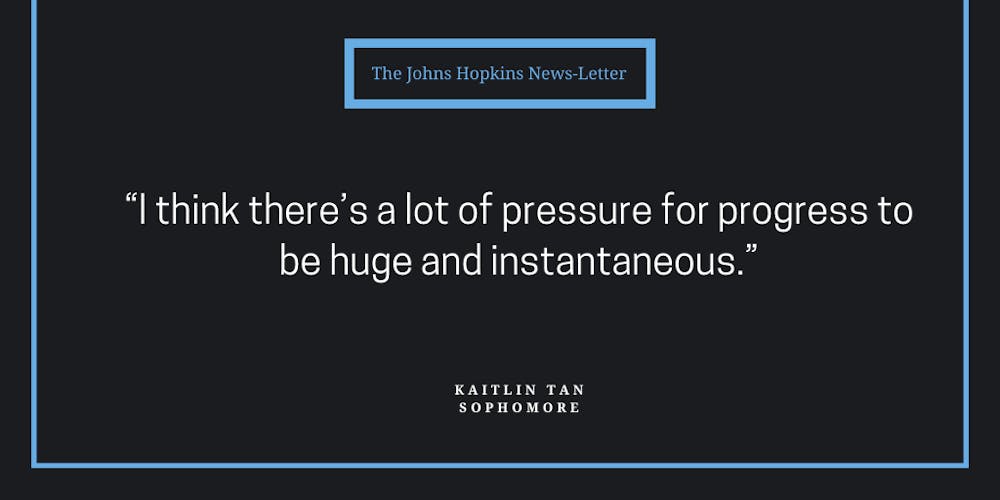The other day, I watched myself age by scrolling through my camera roll. Picture by picture, video by video, I saw change and growth in ways I hadn’t expected. It spurred a little reflection.
It can be difficult to recognize growth as you’re living it. Like how, when you’re a kid, you rarely ever feel the minor changes to your bones and muscles as they stretch and grow. You don’t really know anything’s different until, come holiday season, your relatives start commenting on how much taller you’ve gotten since they last saw you. I spent a lot of my time in high school trying to judge my growth in the present moment, staring at my bones and muscles and willing them to strengthen and change. An impossible task.
I quit dancing when I was younger and decided to start it up again when I was 16. Though nowhere near impossible, it’s still hard to learn to dance at 16. The learning curve is so much more brutal than it is when you’re 10 and under. Everyone expects a certain level of experience and, when there isn’t any to fall back on, it takes forever for your muscles to physically pick up patterns as quickly as they need to. So, my instructor told me to take videos of myself practicing, once per week, and to send them to him.
It was mortifying. There was the anxiety of getting back into my old dance classes, appearing as an utter mess, beside all my former classmates who’d kept practicing through all those years. They were leagues ahead of me. On top of that, being asked to create and store video evidence of my embarrassing clumsiness seemed almost cruel. But I took the videos, as I respected my teacher’s methods.
It was paralyzing at first. I’d fill pages on my camera roll with discarded clips of all the times I couldn’t make it through a full run without looking painfully self-conscious. Then, 30 takes turned into 10 — over months, mind you — and I started to feel a little numb to the process. I would cringe less as I sent them over. I would show up to class the next week with a little less shame.
My drum instructor had a similar way of marking milestones. He was a techy, computer science guy who loved, loved, loved all the ways you could use iMovie to edit videos. He ran a well-put-together travel and family vlog YouTube channel. Because of his interest in cataloging life through videography, he wanted to record and edit videos of me playing the drums every time we finished a song.
I never played quite so badly as when a camera was put on me. Even though it was just for personal records, the camera lens felt like an audience in itself. Then, same as with dance, I grew numb to the feeling. I went on autopilot and focused on the music, on doing whatever it was that I had to do, and did my best to move through the discomfort. A year or so later, I even made it onto his channel (and I barely even freaked out!).
I was scrolling through my camera roll. I was looking for some silly video of one of my high school theater friends to haunt her in the spirit of Halloween. I thought she could use a good old embarrassing video, especially now that she’s studying theater in college and preparing for her first fancy photoshoot. Watching it through though, I didn’t find it gross or embarrassing at all. It was so funny. I can’t disclose what it was because that’d be plain mean, but trust me, it was hilarious.
Then, I fell down a rabbit hole — swiping through all the old videos in my camera roll — drum videos, dance videos... Working my way through the most recent videos down to the earliest clips.
If I’d asked the me in those videos how she thought I’d view her today, she’d expect nothing good. Second-hand embarrassment. Uncontrolled cringe. Nausea. A Google search for “how to disown one’s own self.”
I had nothing but compassion. I felt proud of her, seeing all that. There was growth — very clear leaps when I compared videos that were taken years apart, but incremental growth, too. Those little steps of improvement were visible in the day-to-day, I just had to zoom out a little bit (and wander away, a little bit, as a person) to view it.
I think there’s a lot of pressure for progress to be huge and instantaneous — for a person to skip (or hide away) the bad stage, the messy stage of learning. Maybe it’s easier when you’re little — when big growth is visible because you’re still small. But I, at least, felt pressure emerge at a certain age — to have progressed to a certain level already, or to otherwise find a different room to practice in. So, here I am holding space against that notion — space for learning and continuous growth where underdeveloped, unpolished or unfinished versions of ourselves are welcome to sit and stay.
Kaitlin Tan is a sophomore from Macao majoring in Writing Seminars and Cognitive Science.





